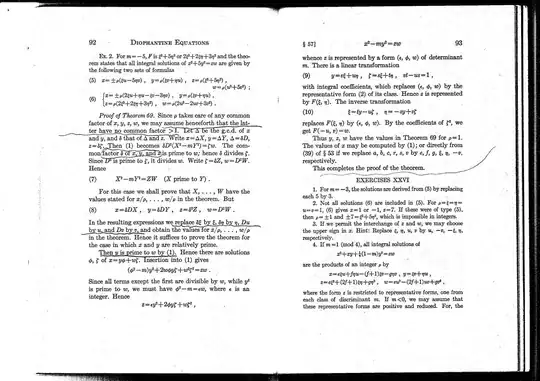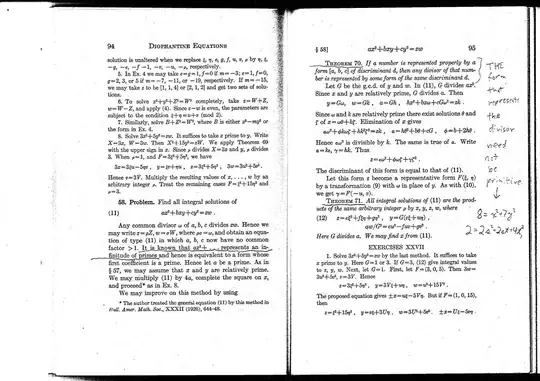Are there any cubes of the form $3x^2\pm xy+5y^2$, with x, y coprime ?
Partly inspired by this question. I tried various computer searches of the form $|x|\le10^a$, $|y|\le10^b$ with $a+b=6$, all of which failed to return any solutions.
Are there any cubes of the form $3x^2\pm xy+5y^2$, with x, y coprime ?
Partly inspired by this question. I tried various computer searches of the form $|x|\le10^a$, $|y|\le10^b$ with $a+b=6$, all of which failed to return any solutions.
Lucian, I think you can do this yourself (for primes) with some hints and some formalism, from Leonard Eugene Dickson, Introduction to the Theory of Numbers. If a prime $q$ is represented as $q = x^2 + xy+ 15 y^2,$ then $3 x^2 + xy + 5 y^2$ does not represent it or its square or cube. If a prime $p$ is represented as $p = 3x^2 + xy+ 5 y^2,$ then $ x^2 + xy + 15 y^2$ does not primitively represent $p^2.$ Meanwhile, $ 3x^2 + xy+ 5 y^2$ does primitively represent $p^2,$ and does represent $p^3$ but not primitively. For primitively, Dickson says properly.
Start with problem 4 at the bottom of page 93, continues onto page 94.
Oh, for $2$ and any prime $r$ such that $(-59|r) = -1,$ no form of discriminant $-59$ represents $r$ or $r^3.$
Not needed: the primes represented by $x^2 + xy + 15 y^2$ are $59$ along with those $p$ for which $$ z^3 + 2 z + 1 \equiv 0 \pmod p $$ has three distinct solutions. The form $3 x^2 + xy + 5 y^2$ represents all other primes with $(-59|p)=1.$


For the equation:
$$3x^2+xy+5y^2=z^3$$
write the formula so that it was easier to go through. To facilitate calculations will make the replacement.
$$p=15k^2+3q^2-21n^2-11qk$$
$$s=25n^2+15k^2+3q^2+10qn-11qk-38kn$$
$$a=42n^2-30k^2-46qn+60qk-16q^2$$
$$t=42n^2-6q^2+8k^2-46nk+12qk$$
$$b=3p^2+6ps-17s^2$$
$$j=p^2+6ps-3s^2$$
Then decisions can be recorded and they are.
$$x=ab-5tj$$
$$y=(a-3t)b+3(2t-a)j$$
$$z=3p^2+4ps+21s^2$$
$q,k,n$ - integers, which we ask.